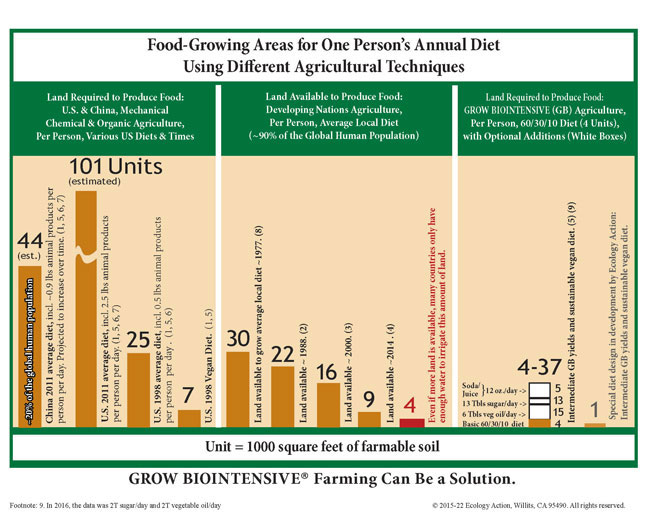Going A Little Bit Vegan Could Help
Save the World In 2015, Ecology Action created the chart above (updated in 2022), showing the area needed to produce food using different agricultural techniques. It illustrates that the average conventionally grown American diet, which relies heavily on animal products, uses much more land than a vegan diet. Unfortunately, many people worry that a vegan diet will be too restrictive or unfamiliar, and think there's no point in trying if they're not going to be "perfect" vegans from the start. But changing habits takes time and persistence, and it’s better to make a series of incremental changes over time to achieve a big goal, rather than never doing it at all! And with going vegan, if we all start making those changes right now, we can make a big difference in terms of sustainability. An article in the journal Nature (Feeding climate and biodiversity goals with novel plant-based meat and milk alternatives) states that if we substitute 50% of animalderived foods with plant-based foods (and restore the forests cleared to raise livestock) we could help reverse the terrible climate impacts animal-based diets have had on our planet: “...We find a substantial reduction in the global environmental impacts by 2050 if globally 50% of the main animal products (pork, chicken, beef and milk) are substituted [with plant-based alternatives]—net reduction of forest and natural land is almost fully halted and agriculture and land use GHG emissions decline by 31% in 2050 compared to 2020. If spared agricultural land within forest ecosystems is restored to forest, climate benefits could double, reaching 92% of the previously estimated land sector mitigation potential. Furthermore, Going A Little Bit Vegan Could Help Save the World the restored area could contribute to 13-25% of the estimated global land restoration needs under target 2 from the Kunming Montreal Global Biodiversity Framework by 2030, and future declines in ecosystem integrity by 2050 would be more than halved. The distribution of these impacts varies across regions—the main impacts on agricultural input use are in China and on environmental outcomes in Sub-Saharan Africa and South America. While beef replacement provides the largest impacts, substituting multiple products is synergistic.” This study focused on using commercial plantbased foods that mimic the taste/texture of meat and milk—which may not be particularly healthy, given the highly processed nature of many of those products. However, the overall idea—that a global dietary shift replacing at least 50% of animal-based foods with plant-based foods can have a big positive impact on global ecosystems—is good news. So, if you’re a meat eater struggling to make your diet more sustainable, don’t give up, get to 50% and then keep going! With a few tweaks and the right seasonings, vegetarian and vegan versions of your favorite dishes can be as good or better than the original. And knowing you're helping to save the Earth every time you substitute an animal product with a plant-based food (especially plants you grow yourself!) just makes every bite that much more delicious. ♥ top | Newsletter Home |Table of Contents| Archive
|



